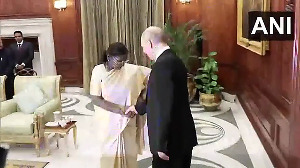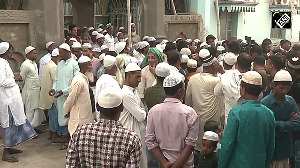
'In the short to medium term, the Myanmar raid will impose caution on Pakistan in planning another 26/11-like adventure. As a result of this caution, even if the proxy war ebbs, it will reduce the danger of escalation to a nuclear stand-off,' says Colonel Anil A Athale (retd).
The recent raid by Indian Special Forces against insurgent camps in Myanmar was an excellent demonstration of the Indian Army's skills in mounting such operations and all those involved deserve congratulations.
The time frame from the ambush of the Dogra battalion in Manipur and the raid was a few days and shows a high degree of readiness.
The clockwork precision of the raid and the fact that our forces suffered zero casualties or damage to equipment even in difficult jungle terrain is another cause for professional satisfaction. The successful raid served as a timely morale booster to our troops everywhere, not just in the North-East.
Unlike in the past, when such raids or operations were kept closely under wraps, this time round the government of the day decided to go public. This has generated a controversy that needs to be discussed since the raid obviously had the larger purpose of 'strategic signaling' to potential insurgents/terrorists in our neighbourhood and beyond (like the Taliban and Islamic State) as well.
Coming on the heels of the robust response to cross border firing, this indeed shows a welcome change of policy from (uninterruptable and uninterrupted) peace rhetoric and dialogue to paying back in the same coin. In case the importance of all this was lost in noise, the Indian defence minister, no less, said that terror will be fought with terror.
The carping criticism by political opponents of the government needs to dismissed with the contempt that it deserves. The charge of 'chest thumping' or 'jingoism' for purely retaliatory action is only possible in 'Incredible India'.
Would they prefer an anaemic or namby-pamby response? Unfortunately over the last several decades our media and public intellectuals have so conditioned our populace that a show of firmness or spine is quickly labeled as jingoism or war mongering. In the words of the late General Krishnaswamy Sundarji, we have begun to equate weakness with being moral and a strong response or strength as immoral.
Of course, the unstated bottom line, in the case of political criticism, is the fear of further loss of electoral support.
But there is another class of critics of the publicity given to the covert action that needs to be taken seriously. Many professionals believe that covert action must be kept secret and we must maintain plausible deniability. This is advocated so that India does not come under international pressure and censure. Many experts, especially in the domain of foreign policy, worry about the effect of these declarations on domestic opinion in other countries and the much vaunted peace process.
But the logical way of looking at this raid, the intent to use terror to fight terror and disproportionate response to cross border firing, is to see it as a clear signal to the would-be adversary that these are consequences of its support to terrorists.
It is a no brainer that a raid by Special Forces -- howsoever successful -- or cross border firing, by themselves cannot alter geo-political realities. But these actions certainly have a psychological effect on the general population of the opponent. This also sows a seed of doubt in the minds of terrorist organisations that their actions can have these consequences.
I have no doubt that India has indeed carried out such operations earlier as well. But keeping these secret and hidden from our people and the adversary's population, we failed to derive the psychological benefits. These benefits raise our population's morale and lower that of the other side.
This is particularly important in case of our western neighbour, where terror organisations like the Lashkar-e-Tayiba enjoy massive popular support. The peace lobby is confined to a tiny well-meaning minority. Sustained terrorist operations mounted by the LeT in India would not be possible without a large degree of popular support.
In turn, this popular support to terrorist organisations makes the local government go soft on any action against them. A classic example of this is the way the 26/11 Mumbai attacks accused or assailants of the Nobel Peace Prize winner Malala Yusufzai have been quietly released from detention.
Like in an insurgency, so too in the case of terrorism, the insurgents and terrorists are like fish swimming in the waters of popular support/sympathy. A long-term solution is to drain that swamp of popular support to the terrorist cause. The general population of the adversary country is the target and not just the so-called masterminds or leaders.
Once the people of the country realise that the price they are paying in violence is the consequence of the actions of the terrorists, over time the support to the terrorists will end. That is the real solution to the problem of terrorism and not catching Muhammad Sayeed or Zaki-ur Rehman Lakhvi. As long as the popular support continues, the terror factories will continue to produce more and more Lakhvis or Ajmal Kasabs.
This will not happen in a month or even a year, but may take a whole generation. But this is the only course open to civilised nations to save themselves from the threat of barbarians like the Taliban or ISIS.
Essentially the actions and statements are a way to build credibility in our posture against the threat posed by terrorism. Deterrence is a product of capability and intent. We always had the capability, but lacked credibility due to lack of intent and action.
In a perverse sense this strong response by India and the open declaration of intent should strengthen the government in the adversary nation to take action against its home-bred terror groups. They can crush these groups, claiming that they are 'enemy agents' or convince the population that their misery is due to actions of the terror organisations.
In plain words, India is attempting to shift to 'deterrence' instead of defence. Deterrence or the threat of offensive action to maintain peace is superior to defence since in a way it pre-empts the possibility of conflict.
In strategic terms, deterrence is based on offensive tactics, but defensive strategy. In case of the best of defensive strategy, the enemy who has the initiative can always make some gains while deterrence aims at prevention of conflict with the threat of certain and effective retaliation.
Openness about our capabilities or the will to implement threats is a necessary component of this strategy.
When US President Barack Obama went on television and announced the killing of Osama bin Laden, besides scoring obvious political points, he was also warning other terror groups and hoping to have a deterrent effect. Our comprador elite did not call that 'chest thumping' or jingoism.
Much of the criticism of making public the details of the raid on insurgent hideouts rests on the naivete of strategically illiterate media warriors.
In the short to medium term, this will impose caution on the adversary in planning another 26/11-like adventure. As a result of this caution -- even if the low intensity/proxy war ebbs -- it will reduce the danger of escalation to a nuclear stand-off.
Peace alone does not always begets peace. As George Washington famously said, 'If you want peace, be prepared for war.'
Image published only for representative purposes.
Colonel Anil A Athale (retd) is a military historian and a qualified commando instructor.










